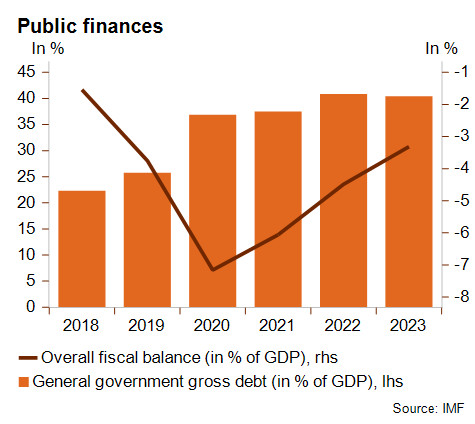Paraguay: Newly elected President Peña will likely uphold strong relations with Taiwan and the return of rainfall will boost the economy

Event
On 30 April, Santiago Peña, from the ruling Colorado Party, won the presidential elections. Peña will take office on 15 August. His election win was not surprising as the Colorado Party is a dominant political force in the country: the Colorado Party has held the presidency for all but five of the past 77 years. The party also secured a majority in both houses of Congress. As a result, Peña will be better placed to pass legislation than current President Mario Abdo Benítez. After the elections, protest erupted as the losing presidential candidates demanded a recount of the votes. The unrest has remained relatively peaceful and is not expected to escalate.
Impact
The win of the Colorado party is likely to be a relief for Taiwan as Paraguay is one of only 13 countries globally to recognise it. Paraguay's decades-long diplomatic relations with Taiwan were an important issue during the election campaign and opposition candidates proposed to break off relations. Since Paraguay is the world’s fourth largest soybean exporter, the agriculture sector is in favour to open up to China and its huge demand for soybeans. However, the win of the Colorado Party means relations with the USA and Taiwan will likely be strengthened.
Looking forward, the outcome of the negotiations, expected in the coming months, between Paraguay and Brazil concerning the electricity output of the Itaipu dam will be important for Peña as well. The Itaipu dam, the third largest hydroelectric plant in the world, is operated together with Brazil. In July 2019, it emerged that President Benítez had struck a secret deal with Brazil, reducing Paraguay’s access to cheap power of its hydroelectric Itaipu dam. Fierce unrest and the risk of impeachment only dissipated after former Brazilian President Bolsonaro agreed to scrap the secret agreement. Hence, a deal on the Itaipu dam that is deemed to be bad for Paraguay would put pressure on the new president early on in his term.
Peña will face pressures to shrink the fiscal deficit. Public debt has been rising in the past years (see graph below) to almost 41% of GDP end 2022, a moderate level for the region but the highest level in two decades for the country. Peña is expected to be committed to fiscal austerity. That being said, the Fiscal Responsibility Law, which limits the fiscal deficit close to the ceiling of 1.5% of GDP, is expected to remain suspended for now and a fiscal deficit of -3.3% of GDP is on the cards for this year. Nevertheless, public finances are judged to be sound and a continued commitment to maintaining their sustainability is expected.

The return of rainfall will boost the agricultural and hydroelectric output this year after last year’s severe drought. As a result, a robust economic growth of about 4.5% is on the cards for this year after a lacklustre growth of 0.2% last year. Moreover, the current account deficit is expected to narrow from -5% of GDP last year to -2.5% this year. Nevertheless, Peña will need to diversify Paraguay’s economy and reduce its heavy dependence on agriculture given the high vulnerability to droughts. As they are becoming more common and extreme due to climate change, droughts could send the Paraguayan economy into recession in the future. In the current context and if the optimistic forecasts on the economic growth materialise, the business environment risk has a positive outlook. MLT and ST political risk classifications have a stable outlook for now.
Analyst: Jolyn Debuysscher – J.Debuysscher@credendo.com